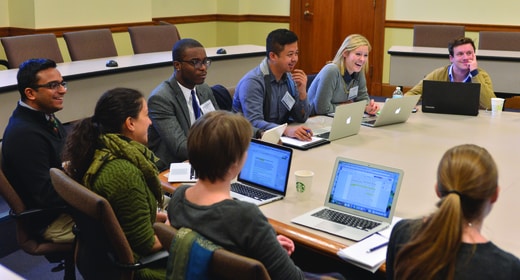
New educational offerings are coming for current and future Fordies, including a powerful new Master of Public Affairs degree and the opportunity for Master of Public Policy students to declare a concentration. Below, Paula Lantz, the Ford School’s associate dean for academic affairs, talks to State & Hill about the new degree and curriculum changes.
State & Hill: What will be the hallmarks of the new Master of Public Affairs degree?
Lantz: A Master of Public Affairs degree focuses on both policy design and analysis—core strengths of the Ford School—along with public management, leadership, and communication skills; we put that all together in a rigorous, high-level, interactive curriculum for people with at least five years of work experience. Students will further their careers in the public sector, non-profit world, government relations, or the private sector.
What makes this degree different?
It’s shorter than our MPP degree—two semesters of course work, or 33 credits, but very much in the Ford School brand of really thinking rigorously about social problems and how policy can intervene. Our MPP students come in with an average of 4 to 5 years of work experience, and the new MPA requires at least that much. We don’t require a GRE, which appeals to some! And an exciting part of this curriculum is that the students will each do an applied capstone project for a client tailored to their interests. They will have a set of deliverables, like an advocacy plan, a policy analysis, a stakeholder assessment or a program evaluation, that they will provide to their clients in partnership with a faculty mentor.

Beyond the required work experience, what type of student are you hoping to attract?
We’re looking for students from all over the world who are dedicated to public service or to doing policy in the private sector and in the spaces in which really good analytic, communication and leadership skills are going to matter in the design and implementation and delivery of public policy and services. Students who are looking to improve their skills and be part of a strong cohort will be a great fit.
MPP students now have the opportunity to declare a concentration. What are the options?
We’re starting with five policy concentrations in the MPP degree program: public policy analysis methods, public and non-profit management, social policy, international policy, and international economic development.
Why would a student declare one of those concentrations?
Students often have a specific passion and their course selection tends to reflect it. This will provide official recognition on their transcript and resume that they have indeed concentrated their studies in a certain area.
How were the five areas selected?
These five concentrations are areas where the Ford School has a deep course offering and faculty expertise. There are lots of other opportunities, too, for students to get expertise in specific areas through the 50 graduate certificate programs on campus. For example, the Ford School is home to the graduate certificate program in science, technology and public policy. In addition, many of our MPP students work towards dual degrees. The concentrations provide yet another way for our students to get depth and official signaling of their specific areas of proficiency.
What else is new and evolving in the curriculum?
We’re always innovating! We’re proud of the Ford School’s leadership in public policy education, and we stay current to attract the best and the brightest students. As part of a recent curriculum review, we’ve made some innovative changes to our pedagogical approach to teaching economics, statistics, program evaluation, and other aspects of applied policy analysis. We remain steadfastly committed to our strategic goals related to diversity, equity, and inclusion. And we’re building new approaches to learning and skill development related to leadership as well as communicating and working across difference in both our curriculum and co-curricular activities.
Learn more about our powerful new Master of Public affairs degree: fordschool.umich.edu/mpa.
Below is a formatted version of this article from State & Hill, the magazine of the Ford School. View the entire Winter 2019 State & Hill.